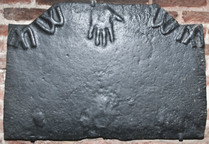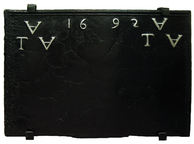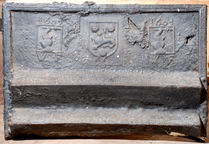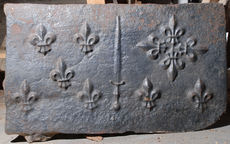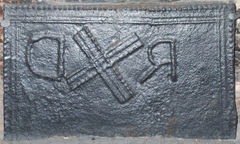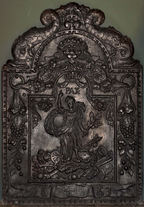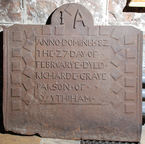-
1113
Description: Quasi-rectangular with a three-facetted arch; top centre, left hand print; around each shoulder, M W mirrored.
Notes: The likelihood is that the M and W are formed of a double-V (virgo virginum) intended to symbolise the Virgin Mary and have an apotropaic (evil-averting) purpose. It may be of significance that hand prints seen on firebacks are always of the left hand.
Inscription: MW WM
- Decoration tags:
- rectangular with triple-facetted arch (shape)
- none (edging)
- simple stamps
- individual letters
- apotropaic
- text
- humans
Manufactured: in the early-17th century possibly in the Weald area of England.
Current location: in private hands, Crowborough, East Sussex, England.
- Attached to series:
- Hand print firebacks
-
302
Description: Rectangular; cyma reversa moulded edging (top and sides); top centre, date with central space; top corners, ‘A’ above ‘TA’, in all cases the ‘A’ is inverted.
Notes: The significance of the inverted ‘A’ is not known; possibly an example from a late 17th-century series which often includes a rose and crown stamp.
Inscription: A 16 92 A / TA TA
- Decoration tags:
- rectangular (shape)
- cyma reversa/ogee (edging)
- carved stamps
- individual letters
- individual numbers
- text
Manufactured: in 1692 in England.
Current location: Gillingham Museum, Gillingham, Dorset, England.
- Attached to series:
- Date & initials firebacks
-
173
Description: Rectangular; twisted rope edging (top, and top two-thirds of sides); rectangular stamp with griffin passant, repeated six times: two in top corners; two in bottom corners, rotated left; two in middle, separated by two inverted shields bearing a rose and crown, placed vertically; across each top corner, a length of twisted rope.
Notes: Five other firebacks bearing these stamps are known: one is also in Hastings, and one, dated 1569, is at Hadlow Down, Sussex. The locations of the other three are not known.
- Decoration tags:
- rectangular (shape)
- rope (edging)
- simple stamps
- carved stamps
- heraldic
- objects
Manufactured: in the mid- to late-16th century in the Weald area of England.
Current location: Hastings Museum and Art Gallery, John's Place, Bohemia Road, Hastings, East Sussex, England.
Museum number: HASMG: 1909.78 (part of the Hastings Museum museum group)
Citation: Baines, J. M., 1958, Wealden Firebacks (Hastings Museum).
- Attached to series:
- Griffin series
-
179
Description: Rectangular; double fillet moulded edging; top centre, on a rectangular block, shield of the arms of the Fowle family - (Gules) a lion passant guardant between three roses (Or); on each side, two rectangles, each containing a helm and the crest of the Fowles - an Arm in armour holding a Battle axe issuant from a Ducal Coronet, above each being the date, 1603, and below each the initials, WF. Across the lower half of the fireback are two solid triangular prisms of iron.
Notes: The stamps relate to William Fowle (1568-1634), ironmaster of Riverhall furnace. The shield stamp also appears on grave slabs in Wadhurst and Frant churches and on an unprovenanced graveslab in Maidstone Museum. The iron prisms were included, perhaps, to retain heat and to prevent the fireback from cracking. Formerly part of the Ade Collection (from Grove Hill, Hellingly, Sussex).
Inscription: 1603 WF [twice]
Arms: William Fowle, of Frant and Wadhurst
- Decoration tags:
- rectangular (shape)
- double fillet (edging)
- carved stamps
- heraldic
- armorial
- text
Manufactured: in 1603 probably at Riverhall Furnace, Wadhurst in the Weald area of England.
Current location: Hastings Museum and Art Gallery, John's Place, Bohemia Road, Hastings, East Sussex, England.
Museum number: HASMG: 1952.51.59 (part of the Hastings Museum museum group)
- Attached to series:
- Fowle series
-
660
Description: Rectangular; plain plate; central, vertical cross-hilt dagger stamp; left side, fleur de lys stamp repeated five times, irregularly arranged in three rows, two above and below and one in the middle; right side, fleur de lys stamp repeated six times, four in a star above two in a row.
Notes: The dagger (length approx. 35cm), seen on two other firebacks (no. 595 and no. 1100), may have beeen of Italian manufacture. The form of the fleurs-de-lys identifies this fireback as one of the ‘Royal’ series, a large group bearing heraldic stamps.
- Decoration tags:
- rectangular (shape)
- none (edging)
- simple stamps
- carved stamps
- heraldic
- objects
Manufactured: in the mid-16th century in the Weald area of England.
Current location: Hole Park, Rolvenden, Kent, England.
- Attached to series:
- Knife & Dagger stamp firebacks
- Royal series
- Fleur-de-lys firebacks
-
664
Description: Rectangular; moulded border with bead edging derived from wooden strips (top and sides); top left, a saltire of the same moulding as the border, between roughly shaped D and R, both reversed.
Notes: The border appears to be in pieces of different lengths, probably from redundant furniture. Illustrated by Christy, 1908, in the possession of Mr E. Simmons of Lewes.
Inscription: D R
- Decoration tags:
- rectangular (shape)
- complex, furniture-derived (edging)
- simple stamps
- individual letters
- apotropaic
- text
- objects
Manufactured: in the early- to mid-16th century in the Weald area of England.
Current location: in private hands, Rolvenden, Kent, England.
- Attached to series:
- Initials only firebacks
-
612
Description: Arched rectangular central panel with astragal edging; allegorical figure of Peace, her right arm raised and her left hand holding an olive branch, standing amid the weapons of war; above her swags of drapery and fruit enclosing the word, PAX; arched rectangular shaped border with ovolo-moulded egg and dart edging; top centre, lion's face from which issue festoons of fruit and leaves which descend down each side, suspended from rings; at the bottom, a motto scroll bearing the date; on top, the face of a putto between two descending fish.
Notes: A more-than-usually elaborate border to a typical central panel.
Inscription: PAX / 16 63
- Decoration tags:
- 'Dutch' (shape)
- ovolo, egg and dart (edging)
- whole carved pattern
- pictorial
- allegorical
- text
- humans
- plants
- objects
Manufactured: in 1663 in the Siegerland area of Germany.
Current location: not known.
- Attached to series:
- 'Dutch' Miscellaneous Firebacks
-
798
Description: Arched rectangular shape with canted top corners; astragal-and-fillet and cavetto moulded strip on each side, angled at top; raised central square panel bearing main inscription in sans-serif characters justified to left (2s formed like Zs); irregular arrangement of small ‘serrated’ square stamps repeated 29 times in two vertical groups of 12 on each side of the inscription panel (6 on the outside, side to side, 6 on the inside, roughly corner to corner); 2 squares, side to side, below each side of the arch, above the inscription panel; 1 square at top of arch between non-matching initials.
Notes: The inscription is the same as on the iron plate above the grave of Richard Gray in Withyham church; another fireback, said to have the same inscription, was formerly at Wolvesey Palace, Winchester, and later in Winchester Museum, but is now missing; the moulding strips are likely to have been derived from furniture. Frances Ashbie and Richard Graye's godson, Richard, the son of William Ashbie, were among the beneficiaries of Richard Graye's will and the initials, IA, on the fireback may relate to another member of that family. The fireback was noted at Sompting, near Lancing, West Sussex, in the 1820s.
Inscription: I A / ANNO·DOMINI·1582 / THE·27·DAY·OF·· / FEBRVARYE·DYED· / RICHARDE·GRAYE / PARSON·OF· · / WYTHIHAM·
- Decoration tags:
- rectangular with round arch (shape)
- complex, furniture-derived (edging)
- carved stamps
- carved pattern panels
- individual letters
- text
Manufactured: in 1582 probably at Hamsell Furnace, Rotherfield in the Weald area of England.
Current location: St Michael's church, Withyham, East Sussex, England.
Citation: Arnold, F., 1871, 'Withyham Monumental Slab', Sussex Archaeological Collections, 23, pp. 320-1.
- Attached to series:
- Richard Graye inscription series
- Epitaph firebacks
